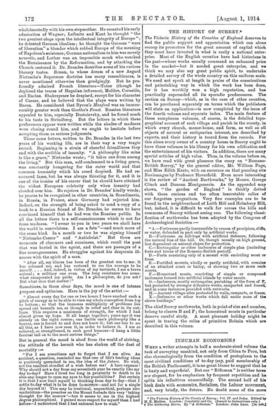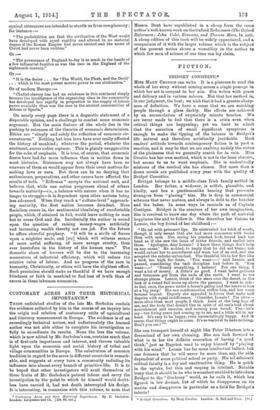INHUMAN ECONOMICS4
WHEN a writer attempts in half a moderate-sized volume the task of surveying mankind, not only from China to Peru, but also chronologically from the condition of protoplasm to the most civilized conditions of to-day (say, paid membership of the British Parliament), it is no great blame to suggest that he is hasty and superficial. But our " Rifleman " is neither terse nor elegant, for he emphasizes by frequent repetition and he splits his infinitives unmercifully. The second half of his book deals with economics, Socialism, the Labour movement, and, very briefly, the future. No doubt some of the more • The Victoria History of the County of Surrey : Vol. IV. and Index. Edited by H. E. Malden. London : Constable and Co. (Issued to Subscribers only.) The Gathering Storm. By "A Sideman." London: John Lane. [da. net.]
cynical utterances are intended to startle us from complacency ; for instance :— " The probabilities are that the civilization of the West would have developed with equal rapidity and altered in no material degree if the Roman Empire had never existed and the name of Christ had never been written."
Or
"The governance of England to-day is as much in the hands of a few influential families as was the case in the England of the eighteenth century."
Or:
"It is the desire . . . for The World, the Flesh, and the Devil' . . . which is the most potent motive power in our civilization."
Or of modern Europe :— " Chattel-slavery has had no existence in this continent simply because the intelligence of the organizing class in the community has developed less rapidly in proportion to the supply of labour power available than was the case in the ancient communities of Athens or Sparta."
On nearly every page there is a dogmatic statement of a disputable opinion, and a challenge to combat some economic argument. But the main feature of the whole lies in the pushing to extremes of the theories of economic determinism.
Ethics are "simply and solely the reflection of economic cir- cumstances." Nothing but iron laws have ever really affected the history of mankind ; whatever the period, whatever the continent, omnes eodem eogimur. This is plainly exaggeration for the sake of emphasis. It is true, of course, that economic forces have had far more influence than is written down in most histories. Statesmen may not always have been so unaware of them as would appear from their overt motives for making laws or wars. But there can be no denying that enthusiasms, preparations, and other causes have affected the results of both. " Rifleman" accepts the national unit, and believes that, while one nation progresses ahead of others towards maturity—i.e., a balance with nature when it has no longer to struggle—it is dependent upon other nations being less advanced. When they reach a "culture-level" approach- ing maturity, the first nation becomes decadent. Here Socialism comes in, the sentimental idealizing of comfortable people, which, if attained in full, would leave nothing to man but to curse God and die. Incidentally the author is sound upon the question of raising money-wages artificially and increasing wealth thereby not one jot. For the future he offers cheerful prophecy. "It will be a strife of forces upon a mightier scale, and [sic] which will witness scenes of more awful suffering, of more savage cruelty, than ever heretofore in the history of the human race." The domestic share of horrors will be due to the increasing momentum of industrial efficiency, which will reduce the relative value of labour. And no progress of the race in humanity, Christianity, or ethics will have the slightest effect.
Such pessimism should make us thankful if we have enough blindness or faith in mankind to find less of truth than of excess in these inhuman economics.



































 Previous page
Previous page